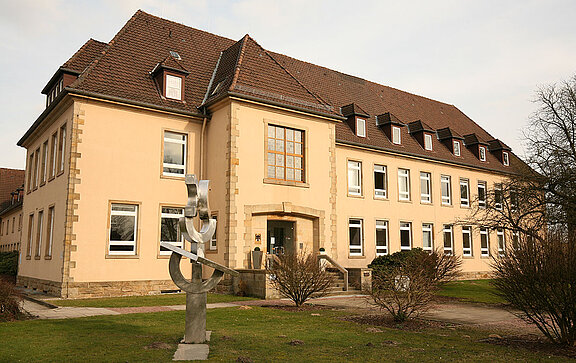
From 1 April 1935 to 31 March 1938 Celle was the domicile of the state-approved experimental and research institute for silk production which was part of the state-approved institutes for apiculture, silk production and small animal husbandry (responsible body: President of the Province of Hanover and Administration of the Provincial Association Hanover). The Reich and Prussian Minister of Food and Agriculture and the Reichsnährstand assigned the institute with the task “to accompany the German silk production scientifically, insofar as the various developmental stages of the silkmoth (Bombyx mori) must be considered as research objects". This included "all questions relating to biology, physiology, genetics, pathology and practical breeding of silkmoths as well as silk technology (physics and chemistry)". On 1 April 1938 the research institute was designated “Reichsanstalt für Seidenbau”.
From 1942 on the research tasks were extended to other fields of small animal breeding and the name was changed to “Reichsforschungsinstitut für Kleintierzucht” on 30 November 1942. From 1948 to 1950 the institute was renamed „Zentralforschungsanstalt für Kleintierzucht “ and in 1950 it was incorporated into the portfolio of the Federal Ministry of Food, Agriculture and Forestry as „Bundesforschungsanstalt für Kleintierzucht“. At first, the emphasis was laid on breeding, husbandry and nutrition of small animals and on diseases and pests of small animals. In the course of the 1960s, the emphasis shifted to poultry research, as poultry farming became an important branch of agriculture.
On 2 July 1974 the research centre in Celle was incorporated into the Federal Agricultural Research Centre (FAL) within the portfolio of the Federal Ministry of Agriculture. Poultry production remained its main research field. The institute gained an international reputation with its research on species-appropriate husbandry systems for laying hens and on disease resistances.
In addition to quality assurance and improvement of food products derived from the small animal production (e.g. nutrition physiological quality, food hygienic safety), the development of husbandry systems complying with ethological, hygienic, ecological, and economic requirements became more and more important over the following years. Other aspects were environmentally safe small animal production and maintenance of genetic diversity as well as the improvement of the competitiveness of small animal production.
On 1 July 1992 the institute was renamed „Institut für Kleintierforschung der FAL-Braunschweig“. In mid-2002 the institute was designated “Institut für Tierschutz und Tierhaltung” of the FAL. Since then, the institute has been concentrating on the development of husbandry systems for farm animals compliant with animal behaviour and animal health. This includes aspects such as transport as well as anaesthetization and killing during slaughtering.
Since the restructuration of research within the portfolio of the Federal Ministry for Food, Agriculture and Consumer Protection (BMELV) with effect of January 1, 2008, the institute in Celle has been part of the Friedrich-Loeffler-Institut.

